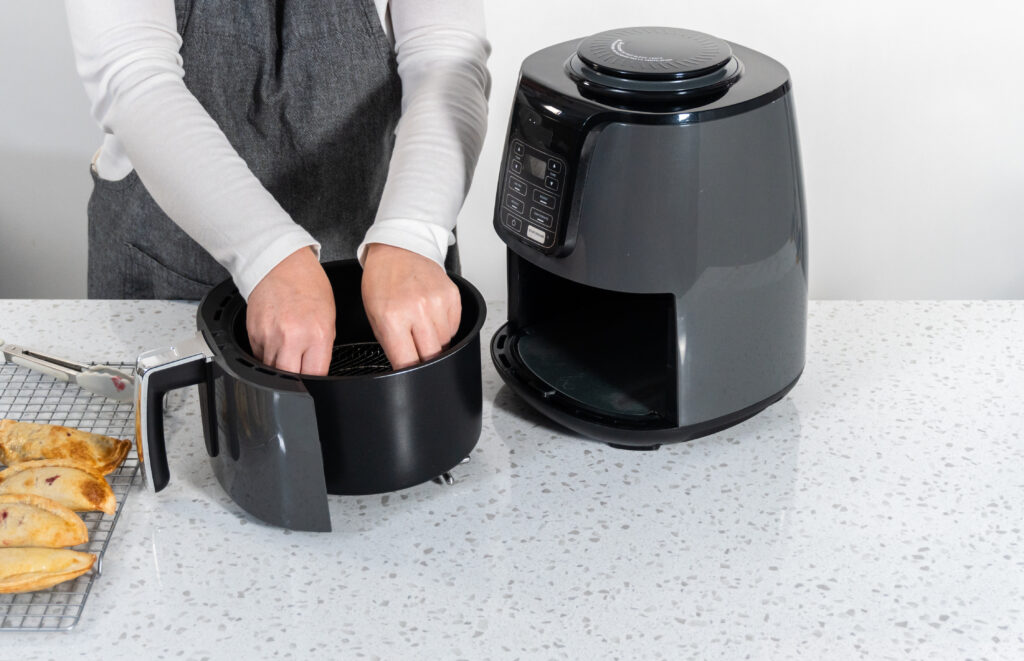How to Deep Clean Your Air Fryer Without Damaging It
- January 12, 2025
- 0
Taking Care of Your Air Fryer: Why Is It Important? An air fryer is an essential appliance in any kitchen that helps you quickly prepare crispy fries, oil-free
Taking Care of Your Air Fryer: Why Is It Important? An air fryer is an essential appliance in any kitchen that helps you quickly prepare crispy fries, oil-free

An air fryer is an essential appliance in any kitchen that helps you quickly prepare crispy fries, oil-free snacks, and golden brown chicken and meals with minimal effort.
With all the great functions available, it only makes sense to be aware that you will be building up grease and grime. So with the oil that seems to splatter everywhere and food remnants hiding in all the small nooks and crannies, it may not take long for unwanted grease and grime to build up in those hard-to-reach areas.
Affect how your air fryer functions,
Alter the taste of your food,
Or worse, create a fire hazard.
This is why deep cleaning your air fryer regularly is not just a good habit—
it is also your obligation.
Before diving into the deep clean, find the tools that are safe and effective to simplify thorough cleaning:
Microfiber cloth or sponge – This is great for wiping down the inside and outside surfaces without scratching surfaces.
Mild dish soap – This can break down the grease while being safe for your non-stick surfaces.
Warm water – Warm water is used for soaking and rinsing all parts.
Soft toothbrush or cleaning brush – Use this to get into tight spots, like the corners, in mesh baskets, and around the heating elements.
Toothpick or wood stick – A toothpick or a wood stick is awesome for getting rid of scraps stuck in vents or gaps/milling areas.
Dry towel – Viruting all parts with dry towel before re-assembling.
Baking soda –a gritty substance that is essential for removing stuck food or grease.
White vinegar – Can help to neutralize odors and cut through grease buildup.
❌ Metal scouring pads – Might damage your heating element or scratch your non-stick surface.
❌ Harsh chemical cleaners – Might wear down the interior coating or leave poisonous residue from the chemicals.
Follow these steps to thoroughly clean your air fryer—keeping it safe, efficient, and looking like new—without damaging any of its components.
Always start by unplugging your air fryer and allowing it to cool down fully before cleaning. This ensures safety and prevents damage to the internal components.
Take out the basket, tray, and pan. Splash them in warm, foamy water for 10-15 minutes to assist release oil, pieces, and stuck-on nourishment. This makes cleaning much easier later.
Using a soft sponge or microfiber cloth dipped in warm, soapy water, gently wipe the inside of the air fryer. Avoid pouring water directly into the unit and do not scrub the heating element—this can cause damage.
Use a toothpick or wooden skewer to remove trapped crumbs from small crevices or vents. These tools help you clean thoroughly without scratching the surfaces.
Use a non-abrasive sponge or brush to scrub away any remaining residue. For stubborn grime, make a baking soda paste (mix water and baking soda), apply it to the affected areas, let it sit for 10 minutes, then scrub and rinse.
Dampen a cloth with mild dish soap and wipe the outer surface of your air fryer. Focus on greasy spots, the handle, and the control panel—areas that tend to collect fingerprints and splatters.
Use a dry towel to thoroughly dry all parts before putting everything back together. Make sure every component is completely dry to prevent any moisture damage or electrical hazards.
Clean your air fryer after every few uses to avoid buildup and extend its lifespan.

To ensure your air fryer stays safe, functional, and long-lasting, avoid these common cleaning mistakes:
The base of the discuss fryer contains electrical components. Submerging it can cause irreparable damage and pose a serious safety hazard.
Using abrasive sponges or metal tools can scratch and strip the non-stick coating inside your air fryer. This not as it were decreases execution but can too compromise nourishment security.
Harsh chemical cleaners or bleach can corrode the materials, weaken seals, and leave toxic residues that could contaminate your food.
Spraying cleaning solutions directly onto the air fryer can cause liquid to seep into electrical components. Instead, spray the cleaner onto a cloth or sponge first.
After every use: Wipe down the basket and interior to prevent grease and food build-up. This keeps your air fryer smelling fresh and running efficiently.
Every 1–2 weeks (or after cooking greasy foods):
Give your air fryer a thorough clean, including soaking removable parts, wiping down the interior, and removing crumbs from crevices.
This cleaning method relies on gentle, cost-effective, and eco-friendly solutions that protect your appliance while keeping it clean. Natural options like white vinegar and baking soda are tough on grease but safe for:
Non-stick coatings – preventing scratches and peeling
Sensitive components – avoiding water damage or corrosion
Food safety – leaving no harmful residue behind
The result? Your air fryer stays in top shape without compromising safety or performance—and it lasts longer, too.
Here are some easy habits that help:
✅ Use perforated parchment liners in the basket to catch drips, crumbs, and grease.
✅ Wipe down the basket after each use to prevent hardened residue from building up.
✅ Opt for lower-grease foods when possible to minimize mess.
These simple practices will make your weekly cleaning routine quicker and easier.
Deep cleaning your air fryer doesn’t need to be time-consuming or complex. With the right tools, a smart cleaning method, and a little consistency, your air fryer will stay:
💡 More efficient
🍽️ Better-tasting
🔥 Safer to use
🧼 Visibly cleaner
Routine maintenance = longer appliance life + peace of mind in your kitchen.
Yes! A 1:1 mixture of vinegar and water is great for removing grease, odors, and residue safely. It’s a natural and effective cleaning solution.
Most air fryer baskets and trays are dishwasher-safe. However, always check the manufacturer’s instructions to confirm before doing so.
Built-up food particles and grease can lead to unpleasant odors, uneven cooking, and even fire hazards. Regular cleaning helps maintain performance and safety.

